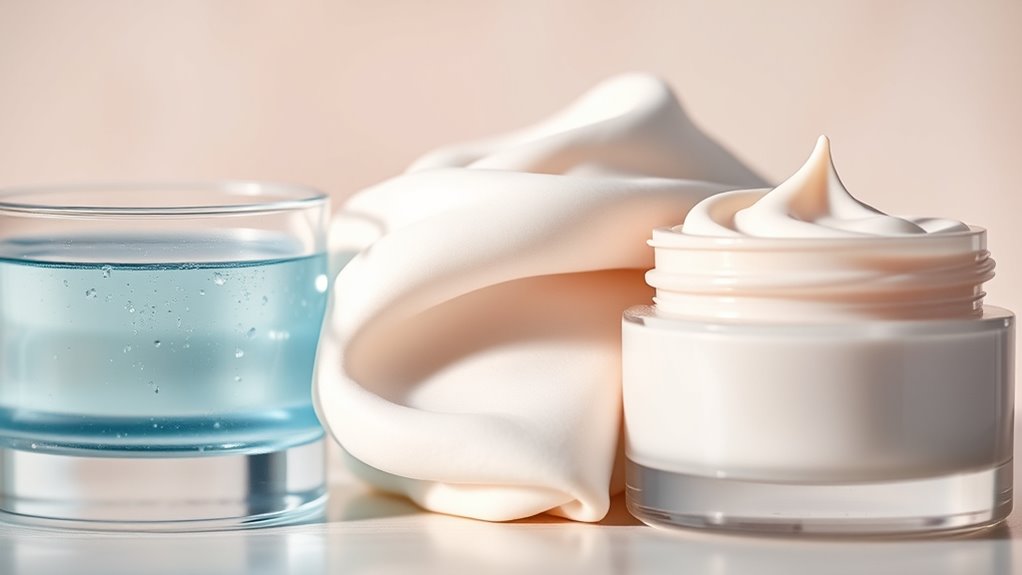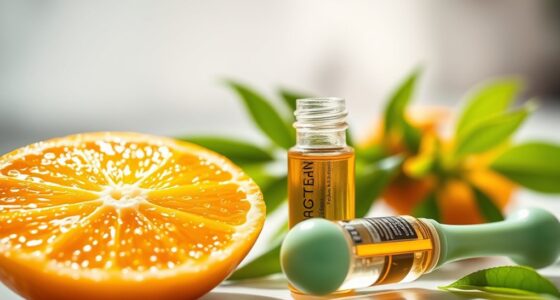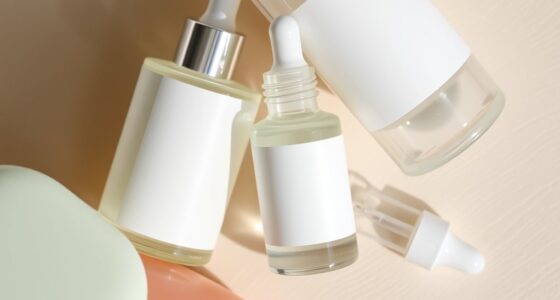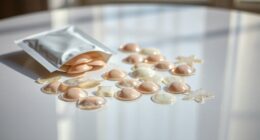Choosing between a gel, lotion, or cream depends on your skin type, climate, and hydration needs. Gels are lightweight and ideal for oily or acne-prone skin, especially in hot weather. Lotions offer a good balance of hydration and nourishment for normal to slightly dry skin. Creams are richer and perfect for very dry or sensitive skin, providing deep moisture. To find the best match for your skin, explore how each formulation works for different conditions.
Key Takeaways
- Gels are lightweight, water-based, absorb quickly, and ideal for oily or acne-prone skin.
- Lotions offer a balanced mix of hydration and nourishment, suitable for normal to slightly dry skin.
- Creams are thick, rich, and best for very dry or sensitive skin, providing intensive hydration and barrier protection.
- Choose based on skin type, climate, and hydration needs; lighter for oily skin, richer for dry or mature skin.
- Understanding formulation differences helps select the most effective moisturizer for your skin.
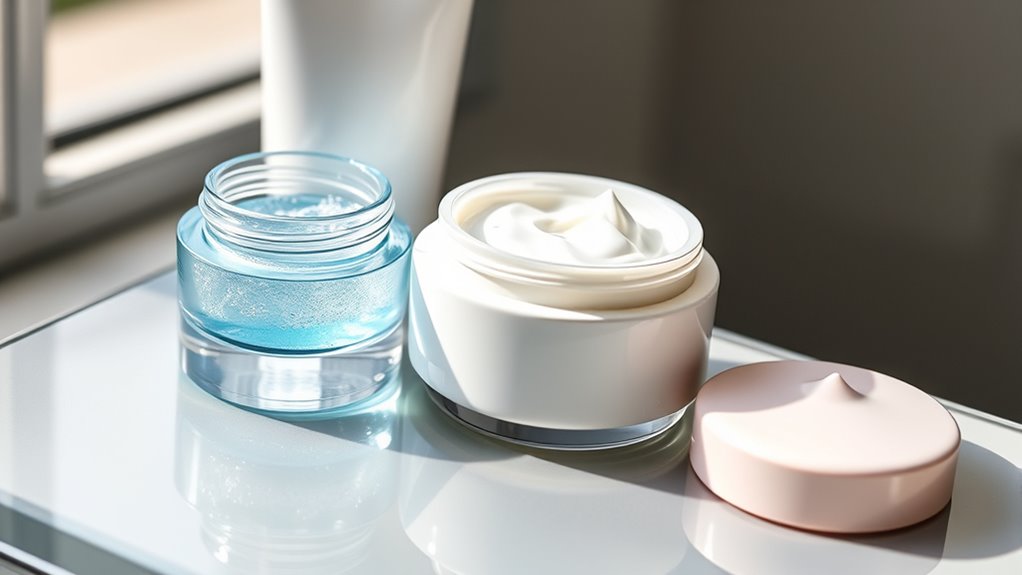
Moisturizers are vital skincare products that help keep your skin hydrated, smooth, and healthy. Choosing between a gel, lotion, or cream can seem overwhelming, but understanding their differences can help you pick the best one for your skin type and needs. Hydration benefits are at the core of any moisturizer’s purpose, but the ingredients that deliver those benefits vary across these formulations. When comparing ingredients, look for humectants like glycerin or hyaluronic acid, which attract water into your skin. Emollients such as oils and fatty acids fill in gaps between skin cells, smoothing roughness. Occlusives like petrolatum or dimethicone create a barrier that locks in moisture, preventing water loss. The choice of ingredients influences how well each moisturizer performs, especially in different environments or for different skin concerns.
Moisturizers hydrate, smooth, and protect with ingredients like humectants, emollients, and occlusives tailored to your skin needs.
Gels are lightweight, water-based formulas that absorb quickly without feeling greasy. They’re particularly suitable if you have oily or acne-prone skin because they won’t clog pores or leave a heavy residue. Gels often contain higher concentrations of humectants, making them excellent for providing hydration benefits without adding oil. They’re ideal for hot or humid climates where you want a revitalizing feel, yet still want to maintain proper moisture levels. If you compare ingredients, gels tend to have minimal oils and emphasize water-soluble components, making them less likely to cause breakouts. However, they might not be sufficient for very dry or mature skin, which benefits from richer formulations.
Lotions sit in the middle, offering a balance between hydration and barrier protection. They’re usually fluid but contain some oils or emollients, making them suitable for normal to slightly dry skin. Lotions often feature a mix of humectants and occlusives, providing hydration benefits while helping to maintain the skin’s natural barrier. Their lightweight nature makes them versatile for daily use or layering under other skincare products. When you compare ingredients, lotions tend to have a moderate concentration of oils, making them less greasy than creams but more nourishing than gels. They work well in various climates and skin types, especially when you prefer a non-heavy feel.
Creams are the thickest, richest formulations, packed with higher levels of oils, emollients, and occlusives. They’re designed for very dry, mature, or sensitive skin, offering intensive hydration benefits and barrier support. The dense texture ensures prolonged moisture retention, which is vital in cold or dry environments. Ingredient comparisons show creams often contain occlusives like petrolatum or lanolin, combined with humectants and emollients, creating a complete barrier against moisture loss. While they might feel heavy or greasy for some, they provide deep nourishment and protection, making them perfect for overnight use or targeted dry patches. Your choice depends on how much moisture your skin needs and whether you prefer a lightweight or richer feel.
Understanding these differences helps you make informed decisions tailored to your skin’s hydration needs, climate, and personal preference. Each type of moisturizer offers unique hydration benefits based on its ingredients and formulation, so choosing the right one ensures your skin stays healthy, comfortable, and well-hydrated.
Frequently Asked Questions
Which Moisturizer Type Is Best for Sensitive Skin?
For sensitive skin, a gentle moisturizer option like a fragrance-free, hypoallergenic cream or lotion is best. These sensitive skin remedies help soothe irritation and keep your skin hydrated without causing flare-ups. Gels are lightweight but may contain alcohol or other ingredients that irritate sensitive skin. Stick with a mild, soothing formula, and always check labels to verify it’s suitable for sensitive skin to avoid unwanted reactions.
Can I Use Gel Moisturizers on Oily Skin?
Yes, you can use gel moisturizers on oily skin. For example, Sarah switched to a gel formula and noticed improved oil control and lightweight hydration throughout her day. Gels are ideal because they’re lightweight, fast-absorbing, and won’t clog pores. They help balance excess oil while keeping your skin hydrated without feeling heavy or greasy, making them perfect for oily skin.
How Often Should I Apply My Moisturizer?
You should apply your moisturizer twice daily, ideally once in the morning and once at night, to maintain proper application frequency. This helps guarantee your skin stays well-hydrated and balanced throughout the day. Adjust the frequency if your skin feels dry or oily, but generally, consistent application promotes ideal skin hydration. Remember, over-application can clog pores, so stick to a routine that keeps your skin comfortable and healthy.
Are There Any Ingredients to Avoid in Moisturizers?
Think of your skin as a delicate garden that needs gentle care. You should avoid moisturizers with fragrance ingredients, as they can cause irritation or allergies. Preservative concerns also matter; some preservatives may irritate or dry out your skin over time. Always check labels for known irritants, and opt for fragrance-free, preservative-free options to keep your skin healthy and happy. Your skin will thank you for the thoughtful choices.
Can Moisturizers Help With Skin Conditions Like Eczema?
Yes, moisturizers can help with skin conditions like eczema, especially when they focus on skin barrier repair. Look for formulations with ingredients like ceramides, hyaluronic acid, or colloidal oatmeal, which soothe and restore your skin. Choose the right moisturizer type—gel, lotion, or cream—based on your skin’s needs. Regular use can reduce flare-ups and improve overall skin health, providing relief and supporting your skin’s healing process.
Conclusion
Choosing the right moisturizer depends on your skin type and personal preference. Whether you go for gel, lotion, or cream, it’s important to keep your skin hydrated and healthy. Don’t put all your eggs in one basket—try different options until you find what works best for you. Remember, taking care of your skin is a marathon, not a sprint, so stay consistent and enjoy the journey to healthier, happier skin.
